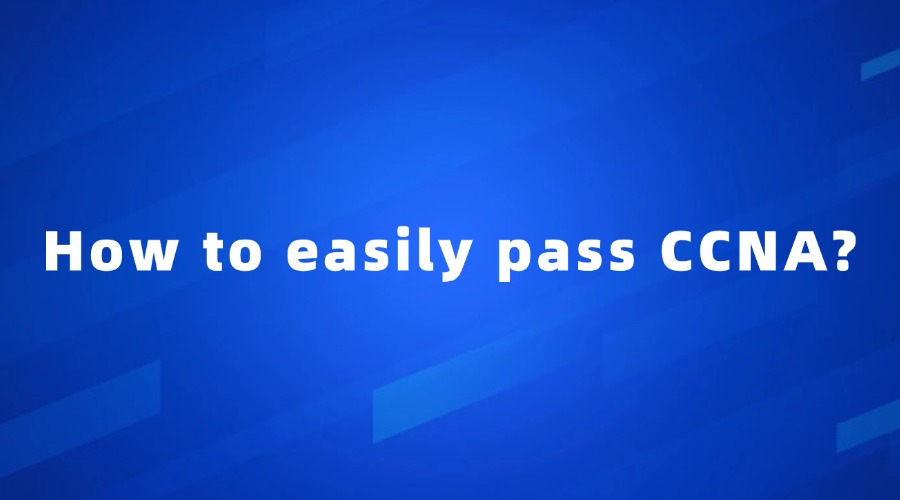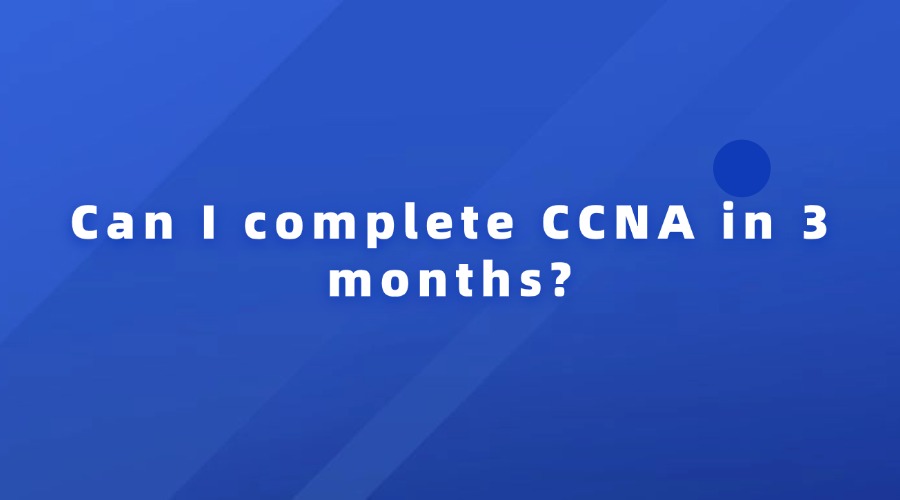Is the CCNP exam difficult?
Update time:2024-11-09
The Cisco Certified Network Professional (CCNP) certification is a highly respected credential in the IT industry. Achieving this certification is often seen as a major career milestone for network professionals, as it demonstrates advanced skills and expertise in areas such as enterprise networking, security, or data centers. However, the question of whether the CCNP exam is difficult largely depends on individual factors such as prior experience, knowledge, and preparation.

In this article, we will break down various aspects of the CCNP exam to help you assess its difficulty.
1. What Does the CCNP Exam Entail?
Before diving into the difficulty level, it’s essential to understand the structure and requirements of the CCNP certification. To achieve a CCNP certification, you need to pass two exams:
Core Exam: This covers foundational topics relevant to the specific track you are pursuing (e.g., CCNP Enterprise, CCNP Security, CCNP Collaboration, etc.). It tests knowledge of general networking concepts, protocols, and technologies.
Concentration Exam: This focuses on more specialized areas within your chosen track, such as advanced routing, network automation, or security technologies.
Each exam consists of multiple subjects, and you are expected to demonstrate your practical skills as well as theoretical knowledge.
2. Complexity of Topics Covered
The CCNP exam is designed for professionals who already have some experience in networking. Here’s why the topics covered might seem challenging:
Advanced Networking Concepts: Compared to entry-level certifications like CCNA, the CCNP dives much deeper into advanced networking protocols, technologies, and design principles. Candidates are expected to have a strong understanding of routing protocols (BGP, OSPF, EIGRP), network security, VPNs, Quality of Service (QoS), and network automation.
Real-World Application: The CCNP exams are structured to test not only theoretical knowledge but also practical application. This means you’ll need to be familiar with real-world scenarios and solutions that are common in enterprise-level networks. Hands-on experience with Cisco devices and configurations is critical for success.
Breadth of Knowledge: The core exam typically covers a wide range of subjects, while the concentration exam goes deep into a particular area. The combination of both can be demanding, as it requires a well-rounded understanding of networking technologies.
3. Prerequisites and Experience
The difficulty of the CCNP exam also depends on your background:
Entry-Level vs. Experienced Candidates: If you are just starting your career in networking and have only basic knowledge, the CCNP exam can be quite challenging. It’s generally recommended to first pass the CCNA certification, which covers foundational networking concepts. Most successful CCNP candidates have several years of practical experience working in network administration or engineering roles.
Experience in Real-World Networking: The more hands-on experience you have, the easier it will be to grasp the practical aspects of the CCNP exam. Networking professionals with experience in configuring, managing, and troubleshooting enterprise-level networks tend to find the exam less daunting.
Prior Knowledge of Cisco Technologies: Cisco’s certification exams focus heavily on Cisco-specific products, technologies, and solutions. Having experience working with Cisco devices (routers, switches, firewalls) and knowing how to configure them can make the exam preparation smoother.
4. Exam Format and Time Pressure
The exam format and time limits also contribute to its perceived difficulty:
Multiple-Choice and Simulation Questions: The CCNP exams include both multiple-choice questions and simulation-based tasks. Simulation questions can be particularly tricky, as they require you to configure or troubleshoot a network in a virtual environment. Mistakes in configuring a device can cost valuable points.
Time Management: The exams typically range from 90 to 120 minutes, depending on the specific track. Managing your time efficiently is crucial, especially when it comes to simulation questions, which can be time-consuming.
Contact me immediately to get the golden key helping you fast express your certificate. 5. Preparation Resources and Study Time
How much time and effort you dedicate to preparation will significantly affect how difficult the CCNP exam feels:
Study Resources: Cisco offers official study materials and training courses, but you can also find third-party books, online courses, practice exams, and study groups. Having access to high-quality resources is vital to understanding the more complex topics.
Hands-On Practice: Practicing configurations on Cisco devices or in a virtual lab environment is critical to passing the exam. Many candidates find the practical aspects of the exam to be the most challenging part, so spending time in lab environments is essential.
Study Time: The amount of time needed to prepare depends on your existing knowledge and experience. On average, candidates spend 3 to 6 months preparing for the CCNP exam. It’s recommended to set aside a few hours each day for studying, practicing lab configurations, and taking mock exams.
6. Failure Rates and Retake Policy
The CCNP exam has a relatively high failure rate, particularly for those who attempt it without sufficient preparation. However, Cisco does allow you to retake the exam after a waiting period. This means if you don’t pass on your first attempt, you can review the areas where you struggled and try again.
Keep in mind that each attempt requires you to pay the exam fee again (typically $400 for the core exam and $300 for the concentration exam), so proper preparation is key to avoiding additional costs.
7. Is the CCNP Exam Worth the Challenge?
While the CCNP exam is difficult, the rewards are substantial. Passing the exam and earning the CCNP certification opens up advanced career opportunities and higher salaries. CCNP-certified professionals often work in roles such as network engineer, network administrator, or IT manager, where they design, implement, and maintain complex enterprise networks.
Many professionals report a significant boost in their career prospects after earning their CCNP certification, making the challenging nature of the exam well worth the effort.
Conclusion
The CCNP exam is challenging, particularly due to its advanced topics, practical focus, and the need for hands-on experience with Cisco devices. However, with proper preparation, access to quality study materials, and consistent practice, many professionals are able to pass the exam and enjoy the career benefits that come with CCNP certification.
The key to success lies in having a solid foundation of networking knowledge, gaining practical experience, and dedicating sufficient time to study. If you approach the exam with the right mindset and preparation, you’ll be well-equipped to handle its challenges.
I'm your man who have the 100% valid dumps , buy it now for 50% off to clear your exam!
Click it ↓↓

In this article, we will break down various aspects of the CCNP exam to help you assess its difficulty.
1. What Does the CCNP Exam Entail?
Before diving into the difficulty level, it’s essential to understand the structure and requirements of the CCNP certification. To achieve a CCNP certification, you need to pass two exams:
Core Exam: This covers foundational topics relevant to the specific track you are pursuing (e.g., CCNP Enterprise, CCNP Security, CCNP Collaboration, etc.). It tests knowledge of general networking concepts, protocols, and technologies.
Concentration Exam: This focuses on more specialized areas within your chosen track, such as advanced routing, network automation, or security technologies.
Each exam consists of multiple subjects, and you are expected to demonstrate your practical skills as well as theoretical knowledge.
2. Complexity of Topics Covered
The CCNP exam is designed for professionals who already have some experience in networking. Here’s why the topics covered might seem challenging:
Advanced Networking Concepts: Compared to entry-level certifications like CCNA, the CCNP dives much deeper into advanced networking protocols, technologies, and design principles. Candidates are expected to have a strong understanding of routing protocols (BGP, OSPF, EIGRP), network security, VPNs, Quality of Service (QoS), and network automation.
Real-World Application: The CCNP exams are structured to test not only theoretical knowledge but also practical application. This means you’ll need to be familiar with real-world scenarios and solutions that are common in enterprise-level networks. Hands-on experience with Cisco devices and configurations is critical for success.
Breadth of Knowledge: The core exam typically covers a wide range of subjects, while the concentration exam goes deep into a particular area. The combination of both can be demanding, as it requires a well-rounded understanding of networking technologies.
3. Prerequisites and Experience
The difficulty of the CCNP exam also depends on your background:
Entry-Level vs. Experienced Candidates: If you are just starting your career in networking and have only basic knowledge, the CCNP exam can be quite challenging. It’s generally recommended to first pass the CCNA certification, which covers foundational networking concepts. Most successful CCNP candidates have several years of practical experience working in network administration or engineering roles.
Experience in Real-World Networking: The more hands-on experience you have, the easier it will be to grasp the practical aspects of the CCNP exam. Networking professionals with experience in configuring, managing, and troubleshooting enterprise-level networks tend to find the exam less daunting.
Prior Knowledge of Cisco Technologies: Cisco’s certification exams focus heavily on Cisco-specific products, technologies, and solutions. Having experience working with Cisco devices (routers, switches, firewalls) and knowing how to configure them can make the exam preparation smoother.
4. Exam Format and Time Pressure
The exam format and time limits also contribute to its perceived difficulty:
Multiple-Choice and Simulation Questions: The CCNP exams include both multiple-choice questions and simulation-based tasks. Simulation questions can be particularly tricky, as they require you to configure or troubleshoot a network in a virtual environment. Mistakes in configuring a device can cost valuable points.
Time Management: The exams typically range from 90 to 120 minutes, depending on the specific track. Managing your time efficiently is crucial, especially when it comes to simulation questions, which can be time-consuming.
Contact me immediately to get the golden key helping you fast express your certificate. 5. Preparation Resources and Study Time
How much time and effort you dedicate to preparation will significantly affect how difficult the CCNP exam feels:
Study Resources: Cisco offers official study materials and training courses, but you can also find third-party books, online courses, practice exams, and study groups. Having access to high-quality resources is vital to understanding the more complex topics.
Hands-On Practice: Practicing configurations on Cisco devices or in a virtual lab environment is critical to passing the exam. Many candidates find the practical aspects of the exam to be the most challenging part, so spending time in lab environments is essential.
Study Time: The amount of time needed to prepare depends on your existing knowledge and experience. On average, candidates spend 3 to 6 months preparing for the CCNP exam. It’s recommended to set aside a few hours each day for studying, practicing lab configurations, and taking mock exams.
6. Failure Rates and Retake Policy
The CCNP exam has a relatively high failure rate, particularly for those who attempt it without sufficient preparation. However, Cisco does allow you to retake the exam after a waiting period. This means if you don’t pass on your first attempt, you can review the areas where you struggled and try again.
Keep in mind that each attempt requires you to pay the exam fee again (typically $400 for the core exam and $300 for the concentration exam), so proper preparation is key to avoiding additional costs.
7. Is the CCNP Exam Worth the Challenge?
While the CCNP exam is difficult, the rewards are substantial. Passing the exam and earning the CCNP certification opens up advanced career opportunities and higher salaries. CCNP-certified professionals often work in roles such as network engineer, network administrator, or IT manager, where they design, implement, and maintain complex enterprise networks.
Many professionals report a significant boost in their career prospects after earning their CCNP certification, making the challenging nature of the exam well worth the effort.
Conclusion
The CCNP exam is challenging, particularly due to its advanced topics, practical focus, and the need for hands-on experience with Cisco devices. However, with proper preparation, access to quality study materials, and consistent practice, many professionals are able to pass the exam and enjoy the career benefits that come with CCNP certification.
The key to success lies in having a solid foundation of networking knowledge, gaining practical experience, and dedicating sufficient time to study. If you approach the exam with the right mindset and preparation, you’ll be well-equipped to handle its challenges.
I'm your man who have the 100% valid dumps , buy it now for 50% off to clear your exam!
Click it ↓↓














